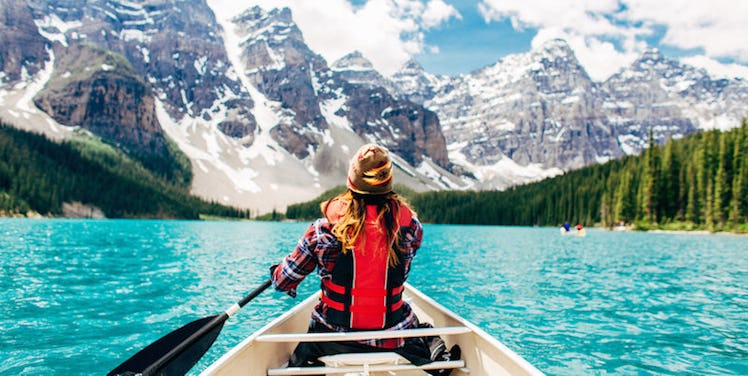
People Who Travel Alone All Have One Thing In Common: They're Wise
There's nothing quite like waking up by yourself in an unfamiliar place with nothing to do but explore. It's simultaneously invigorating and unnerving.
But the frightening aspects of it are precisely what make it so intoxicating.
Adventurous souls are infatuated with uncharted territory. They're driven by wanderlust, and a perpetual desire to embrace the unfamiliar.
Those who travel alone possess these characteristics and beyond that, they recognize the inherent value of celebrating earth and its dynamism on your own.
We are all citizens of the world, and traveling alone is the ultimate validation of this. When you travel by yourself, you belong to no one and everyone all at once.
There is certainly value and great joy to be found in traveling with others, but it's also far more predictable. Through solo travel, you become more comfortable going with the flow, which is vital to success, survival and happiness.
Indeed, traveling alone is underrated.
Solo travel breeds enlightenment.
Solo travel allows you to set the pace of the journey. You make your own plans and dictate your own schedule.
But with no one to watch your back, you're also responsible for your own safety. In turn, your instincts become your guide and greatest friend.
When you venture into the unknown by your lonesome, it drives your senses into overdrive. Humans are never more perceptive than when they're immersed in the unfamiliar -- it's a survival mechanism.
Thus, via solo travel, you absorb and recognize far more than you would if traveling with companions. You sense, feel and learn more than you could've ever anticipated.
Individual excursions help us shed naïveté about the world, broadening our perspectives while making us more keenly aware of our vulnerabilities and idiosyncrasies.
To borrow from Henry Miller:
One's destination is never a place but rather a new way of looking at things.
Simply put, traveling alone makes us wise, as it fosters both outward and inward discovery.
Traveling alone reduces stress and increases self-awareness.
Make no mistake, if you travel alone, there will be times you feel extremely lonely.
Even if you're completely surrounded by people, loneliness can creep in -- particularly if you're in a place where no one speaks your native tongue and communication is difficult.
But the experience will also help you understand the important distinction between being alone and feeling alone.
Solitude and loneliness are not one in the same. Loneliness increases feelings of isolation and depletes the spirit. Solitude increases self-awareness and ultimately makes us feel more connected with the world. We are never truly alone, but it's difficult to recognize this without time to reflect on it.
Humans are social creatures; we wouldn't survive without the presence of other people. In seeking out company, however, we often fail to recognize the benefits of solitude.
Life is full of distractions, and it's difficult to live in the moment. We need time to sit with our thoughts and process it all.
Reflection is vital to our mental health, and it's much easier when we're separate from others.
Research shows that mindfulness meditation, or the practice of focusing intently on the present, can decrease anxiety significantly as it helps reduce the stress hormone, cortisol.
Traveling alone provides for this type of benevolent reflection.
The heightened awareness that accompanies this form of travel, combined with the excitement of new experiences, unconsciously focuses your mind on the present.
In turn, you begin to let go of the past, and the pain and regrets that often come with it.
At the same time, you stop worrying so much about the future.
In other words, solo travel helps free your mind and teaches you to celebrate each and every breath.
Self-discovery requires exploration.
Perhaps the best aspect of traveling alone is that while you discover the world, you encounter your truest self. It's an intrinsically self-reflective form of journeying.
Limitations you've been placing on yourself become elucidated, inspiring you to step outside of your comfort zone.
Traveling with others allows us to latch onto the familiar, but during solo excursions we have no choice but to venture into uncharted territory, physically and mentally.
You make friends with strangers, eat cuisine you've never heard of, listen to music played with instruments you can't name and begin to see the world in an entirely new light.
In the process, you become a more confident individual, ready to run out into the wild with nothing but a smile on your face and a passion for new experiences.
When we travel alone, we also discover we're just a small, but interconnected, piece of a big, bright, dynamic and beautiful world. There's nothing more healthy for the ego than to recognize while you're not the center of the universe, you're still connected with it.
This epiphany will make you revel in the diverse nature of the world and its inhabitants. You'll care more about the well-being of other people as well as the overall health of the planet.
Simply put, solo travel will make you a kinder, more empathic and insightful individual.
It teaches you to seek out and celebrate the unfamiliar, making you more adept at adjusting to the only constant in life: change.
You'll find answers to questions you didn't know you were asking, have adventures you never imagined and grow as a person in immeasurable ways.
To travel alone is to get lost on purpose, in order to be found.
Citations: Mindfulness meditation may ease anxiety mental stress (Harvard Medical School), Traveling Alone 5 Stress Relieving Benefits Of Solo Journeys (Huffington Post)